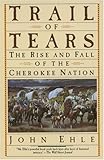
Trail of Tears: The Rise and Fall of the Cherokee Nation
2 journalers for this copy...
Trail of Tears The Rise and Fall of the Cherokee Nation
Author: John Ehle
One of the many ironies of U.S. government policy toward Indians in the early 1800s is that it persisted in removing to the West those who had most successfully adapted to European values. As whites encroached on Cherokee land, many Native leaders responded by educating their children, learning English, and developing plantations. Such a leader was Ridge, who had fought with Andrew Jackson against the British. As he and other Cherokee leaders grappled with the issue of moving, the land-hungry Georgia legislatiors, with the aid of Jackson, succeeded in ousting the Cherokee from their land, forcing them to make the arduous journey West on the infamous "Trail of Tears." (Library Journal)
Author: John Ehle
One of the many ironies of U.S. government policy toward Indians in the early 1800s is that it persisted in removing to the West those who had most successfully adapted to European values. As whites encroached on Cherokee land, many Native leaders responded by educating their children, learning English, and developing plantations. Such a leader was Ridge, who had fought with Andrew Jackson against the British. As he and other Cherokee leaders grappled with the issue of moving, the land-hungry Georgia legislatiors, with the aid of Jackson, succeeded in ousting the Cherokee from their land, forcing them to make the arduous journey West on the infamous "Trail of Tears." (Library Journal)
"The Trail of Tears" is something that is briefly mentioned in high school history books about the removal of the Cherokee people from the East to Cherokee territory in Oklahoma. However, as I remember, the history books gave very little detail of how and why this happened. In recent years, Andrew Jackson has received a lot of the blame for this, going so far as a move to remove him from the 20-dollar bill and replace him with Harriet Tubman (this has not happened yet and given President Trump's praise of Jackson, I doubt if it will happen anytime soon - Trump is often seen with a portrait of Jackson in his office).
This book was sometimes hard to read with a somewhat stilted style, but it gave a very good history of the Cherokee people including their beliefs and rituals and how they lived in the South prior to their removal. I was surprised to learn that many of the Cherokee chiefs were half-breeds with European lineages. Some of them also operated large plantations which included slavery. Many of the tribe also adopted English names and converted to Christianity. The book focuses on two factions of the tribe. One led by Major Ridge, who had actually fought with Jackson during the War of 1812. He and his sons eventually agreed that the Cherokees should sign a treaty and go peaceably to land west of the Mississippi. The other faction was led by Chief John Ross who adamantly opposed any move and tried unsuccessfully to get the government in Washington to agree with him. Ridge and his sons did make a treaty with the government and agreed to move which was ratified even though the majority of the tribe disagreed with it.
So why were the Cherokees forced to leave? Basically, because of the greed of whites in Georgia and the government who wanted their land and possessions. This did include Jackson who had for years stated that the Indians needed to be relocated to the west. As one witness in the book stated:
"A whole Indian nation abandons the pagan practices of their ancestors, adopts the Christian religion, uses books printed in their own language, submits to the government of their elders, builds houses and temples of worship, relies upon agriculture for their support, and produces men of great ability to rule over them, and to whom they give a willing obedience. Are not these the great principles of civilization? They are driven from their religious and social state then, not because they cannot be civilized, but because a pseudo set of civilized beings, who are too strong for them, want their possessions!"
The Cherokee had adopted many of the white ways through missionary work by different Christian factions and had in many ways been assimilated into society. This included the work of Sequoya in developing a written Cherokee language. However, many of the full-bloods did not agree to be assimilated and they were the ones who agreed with John Ross that they should not leave. The government originally wanted to move the Indians by way of the rivers to the west and many took advantage of this early on - mostly the followers of Chief Ridge. However, those that stayed behind until the last went by land as agreed to by John Ross and this is where many died and the trip became the "Trail of Tears." Ross himself and his family did use the river route to move. There were different estimates of the death count ranging from 400 to 4000. Some of this could have been avoided if the tribe had agreed to use the river and move before they were forced to leave. Once the Cherokee arrived in the West, there continued to be squabbles between the two factions which resulted in tragedy for the Ridge family.
Overall, this was a good history of the Cherokee and their fate. I learned a lot from reading this but as I said earlier, the writing was sometimes hard to get through. But I would recommend this to anyone interested in Native American history.
This book was sometimes hard to read with a somewhat stilted style, but it gave a very good history of the Cherokee people including their beliefs and rituals and how they lived in the South prior to their removal. I was surprised to learn that many of the Cherokee chiefs were half-breeds with European lineages. Some of them also operated large plantations which included slavery. Many of the tribe also adopted English names and converted to Christianity. The book focuses on two factions of the tribe. One led by Major Ridge, who had actually fought with Jackson during the War of 1812. He and his sons eventually agreed that the Cherokees should sign a treaty and go peaceably to land west of the Mississippi. The other faction was led by Chief John Ross who adamantly opposed any move and tried unsuccessfully to get the government in Washington to agree with him. Ridge and his sons did make a treaty with the government and agreed to move which was ratified even though the majority of the tribe disagreed with it.
So why were the Cherokees forced to leave? Basically, because of the greed of whites in Georgia and the government who wanted their land and possessions. This did include Jackson who had for years stated that the Indians needed to be relocated to the west. As one witness in the book stated:
"A whole Indian nation abandons the pagan practices of their ancestors, adopts the Christian religion, uses books printed in their own language, submits to the government of their elders, builds houses and temples of worship, relies upon agriculture for their support, and produces men of great ability to rule over them, and to whom they give a willing obedience. Are not these the great principles of civilization? They are driven from their religious and social state then, not because they cannot be civilized, but because a pseudo set of civilized beings, who are too strong for them, want their possessions!"
The Cherokee had adopted many of the white ways through missionary work by different Christian factions and had in many ways been assimilated into society. This included the work of Sequoya in developing a written Cherokee language. However, many of the full-bloods did not agree to be assimilated and they were the ones who agreed with John Ross that they should not leave. The government originally wanted to move the Indians by way of the rivers to the west and many took advantage of this early on - mostly the followers of Chief Ridge. However, those that stayed behind until the last went by land as agreed to by John Ross and this is where many died and the trip became the "Trail of Tears." Ross himself and his family did use the river route to move. There were different estimates of the death count ranging from 400 to 4000. Some of this could have been avoided if the tribe had agreed to use the river and move before they were forced to leave. Once the Cherokee arrived in the West, there continued to be squabbles between the two factions which resulted in tragedy for the Ridge family.
Overall, this was a good history of the Cherokee and their fate. I learned a lot from reading this but as I said earlier, the writing was sometimes hard to get through. But I would recommend this to anyone interested in Native American history.
Journal Entry 3 by  perryfran
perryfran at RABCK, A RABCK -- Controlled Releases on Thursday, February 15, 2018
at RABCK, A RABCK -- Controlled Releases on Thursday, February 15, 2018
 perryfran
perryfran at RABCK, A RABCK -- Controlled Releases on Thursday, February 15, 2018
at RABCK, A RABCK -- Controlled Releases on Thursday, February 15, 2018
Thank you very much for the RABCK, I appreciate this.
We zoom in on a piece of history, the long walk of the Cherokee people from their ancestral lands in the east to the land assigned to them, by the U.S. government, in the west.
We see not just the forced evacuation and tragic march, we focus in on the individual people and decisions that led to this outcome. It doesn't become any less tragic but it takes on a great deal of depth and complexity with a lot of shades of gray.
Recommended








